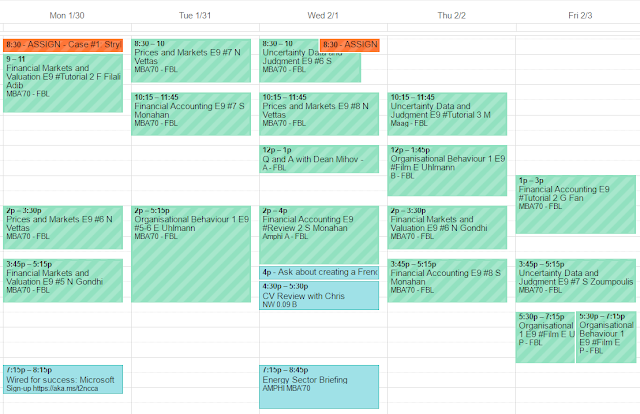INSEAD P2
P2 was chaos at INSEAD. My course volume increased from four courses to six, and at the same time I was busy with job recruiting events. The first week back to school there was an employer presentation every single night followed by networking cocktails. Students, including myself, were scrambling to finish internship applications for consulting firms as well as other big firms like Amazon, Uber, Microsoft, and others. Pretty much everyone was in firefighting mode just trying to get done the tasks due in the next 1-2 days.
I was swept into the chaos because the place I had interned in the fall that had promised me a summer internship had gone radio silent. Despite turning in my application on February 9th, as of March 15th when all the applications were due, I had heard nothing. So, in order to make sure I didn’t end up with nothing, I jumped into the rat race and submitted applications. Unfortunately, most companies were not interested in people recruiting for the United States as those positions had already been filled in the fall by American MBAs. In the end, I only had two interviews and neither of them made me an offer.
The realities of job searching are tough. I applied to the following:
On-campus recruiting: 2/5
At-large candidate (MBA job boards): 0/6
I was surprised I didn’t hear back from any of the MBA job board positions because they were specifically looking for MBA interns with electricity/energy backgrounds. For one of the companies, I had literally interned at their competitor in the exact same position. How is that not relevant experience or at least enough to merit an interview? What these numbers have told me is that on-campus recruiting and jobs obtained through networking are the key. If I apply to an online job posting, I need to somehow also network my way into someone at the company. Otherwise, my application will be missed in the shuffle.
There is a good book on this called “The 2 hour job search.” The premise of the book is that you should conduct many informational interviews with people in your target industry. The key is NOT to ask for a job, but rather to be collecting information. People change their mentality when they feel like you are asking for a job and they are unlikely to be helpful. The book says that if you do a good job listening to the people in the informational interviews and ask good questions, they will put you in touch with more people to talk to. So far I have done about 4 of these informational interviews and they have gone relatively well, but no one has offered any additional names so my path somewhat dead ends. I will keep working on this during the summer when I am in the US and it is easier to set up Skype calls.
Back to P2, it’s over now and finals week was intense. There was simply not enough time to study adequately for all the materials so it became an exercise in triage in making sure that you were pretty good at all the subjects, but a master of none. As the grades are based on a curve, what really matters is how I do compared to my peers. In P1 I did well, and I am hopeful that I will be on the Dean’s List (Top 10%) for P1 & P2 combined, which is announced in a few weeks. P1 & P2 comprised the core subject matter that was obligatory for everyone and I took all my classes with the same cohort. Moving into P3, all courses are electives and my classmates will vary across my classes. For now, I’m not thinking too much about P3 and I’m just happy to have a chance to relax and reflect a bit.


Comments